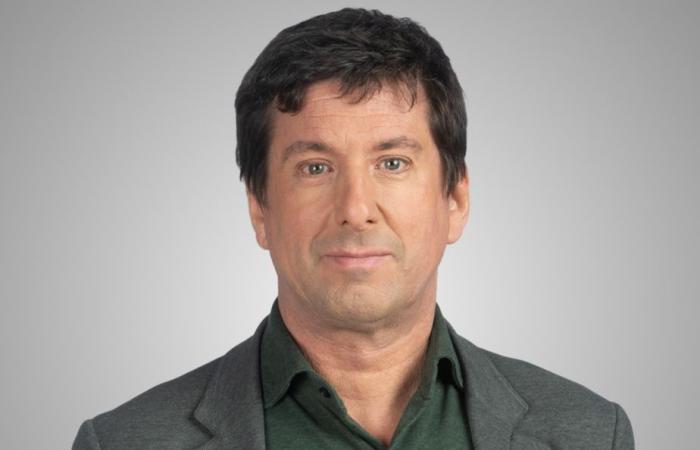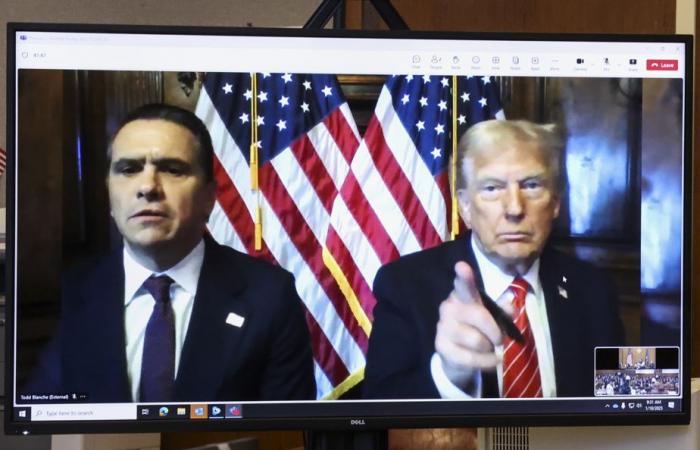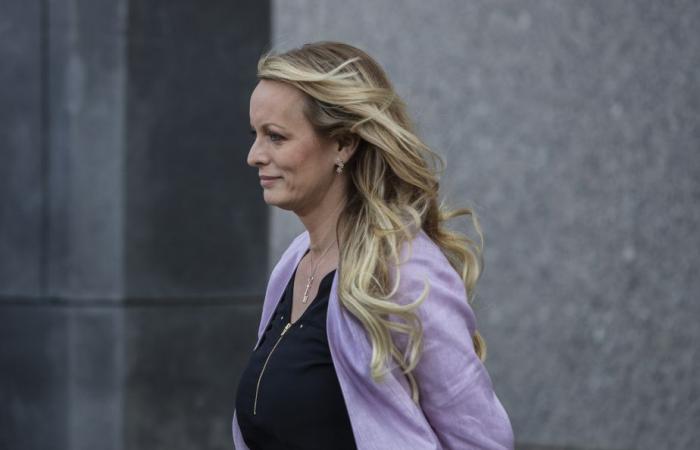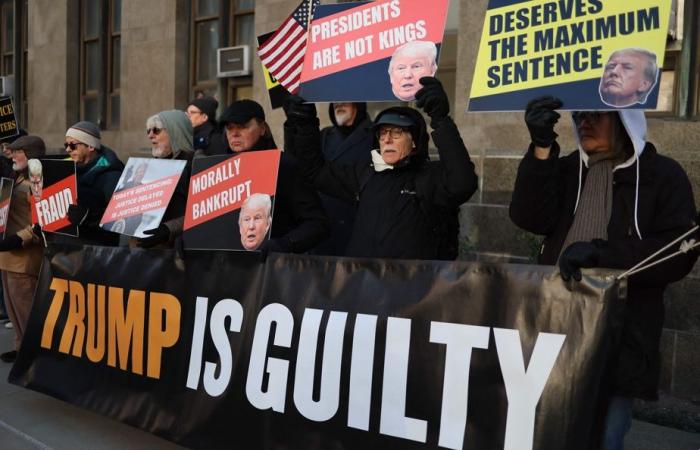(Washington) Donald Trump officially became a “criminal” by receiving what we would call here an absolution in a New York court.
Published at 7:30 a.m.
But perhaps it is what happened the day before in Washington that is most important: the Supreme Court let criminal justice against the president-elect take its course.
PHOTO BRENDAN MCDERMID, ASSOCIATED PRESS
Attorney Todd Blanche (left) and President-elect Donald Trump attended the sentencing in the “Stormy Daniels” case remotely on Friday.
A seemingly purely technical decision, but which is a message sent by the chief justice: the Supreme Court is not (totally) subject to the future president.
Donald Trump indeed tried by all means to prevent the sentencing against him in the New York State case. The jury’s verdict, delivered on May 30, came just before the election campaign. Trump managed to push back sentencing for this fraud until November.
But his election posed a thorny new constitutional problem: how to punish a sitting president? All federal criminal cases against him have been dropped, because you don’t hinder a presidency with court cases.
By the same logic, shouldn’t we ignore the “Stormy Daniels” affair?
The trial judge, Juan Merchan, answered “no.” First, this case falls under the jurisdiction of the State of New York, not the federal courts. Second, it concerns facts that occurred before Trump’s first election. And above all, a verdict has already been rendered. To overturn the jury’s verdict would be to deny the rule of law.
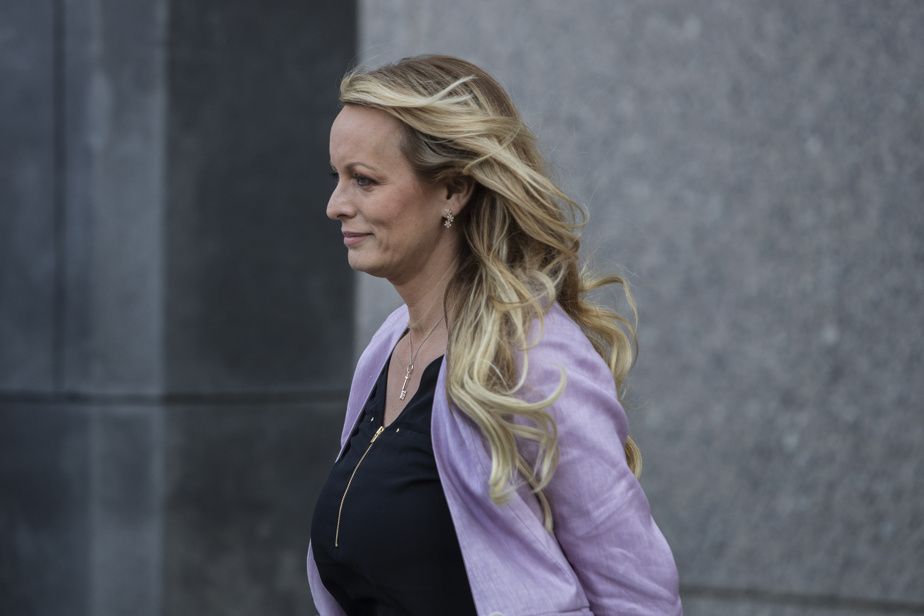
PHOTO VICTOR J. BLUE, ARCHIVES BLOOMBERG
Stormy Daniels, leaving New York federal court, in 2018
Judge Merchan, as he said on Friday, was faced with a completely extraordinary, unprecedented case. Never has a former president been tried in a criminal court, much less found guilty. Media and popular interest, the level of security, political interference of all kinds have reached an incredible level.
“And yet, once the doors closed, this trial was no different from the 32 others going on at the same time in the courthouse,” the judge said.
The magistrate therefore had to recognize the exceptional aspect of the case: an anonymous citizen in the same circumstances would undoubtedly have received a fine, or at worst a light prison sentence. It was impractical here. Judge Merchan had announced in advance that there would be no imprisonment or fine.
At the same time, he could not deny the verdict without making a mockery of the justice system.
The judge therefore opted for a symbolic sentence. Donald J. Trump is still officially a felon in the eyes of justice, unless there is a victory on appeal.
“He caused lasting damage to the public’s perception of criminal justice and endangered officers of the court,” prosecutor Joshua Steinglass said.
Trump launched numerous personal attacks against the judge, prosecutors and court employees. Everyone received threats of all kinds. Politicians came to the courthouse to “support” the defendant Trump, but ultimately intimidate the court and jury.
In the end, everyone is unhappy: the anti-Trump people find the sentence too lenient… and Trump is humiliated. But the judge didn’t really have a choice.
The content of this “sentence” was already announced. On Friday, the judge refrained from making the slightest comment on the progress of the trial and the incessant and serious attacks to which he was the subject.
This is why I insist: the most interesting decision is the one rendered Thursday by the nine justices of the Supreme Court, refusing Trump’s request to overturn the sentence.
What did the Supreme Court say that was so extraordinary? It’s a one-paragraph “judgment.” It says two things: 1) Trump’s complaints about the trial can be heard on appeal, as in any case; 2) it cannot be claimed that the sentence will be a burden on the shoulders of the president-elect or would harm his work, since Judge Merchan had announced in advance his intention to pronounce an unconditional absolution.
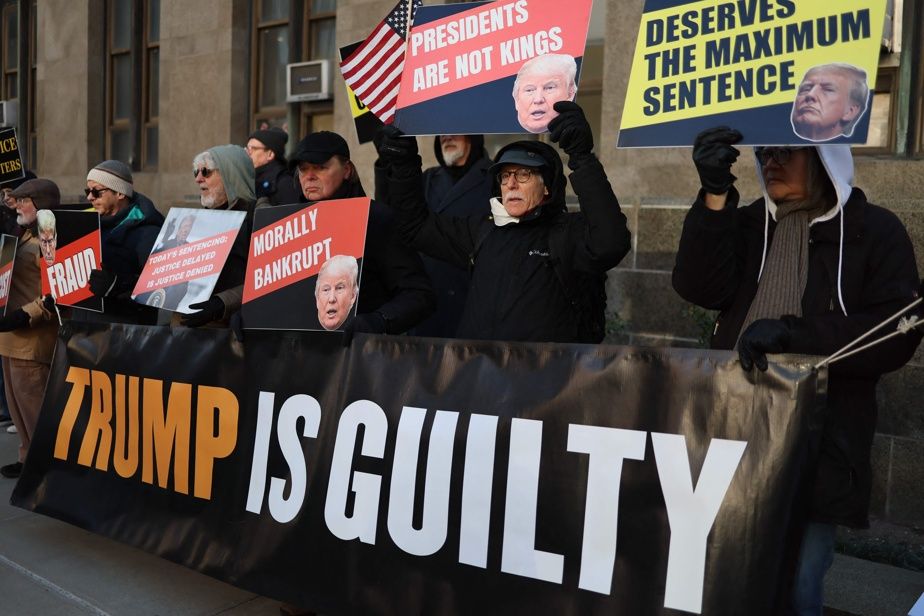
PHOTO CHARLY TRIBALLEAU, AGENCE FRANCE-PRESSE
Anti-Trump protesters gathered outside Manhattan Criminal Court on Friday during the president-elect’s sentencing in the “Stormy Daniels” case.
This microscopic decision was rendered by five judges to four. The two ultraconservatives, Clarence Thomas and Samuel Alito, both involved in scandals involving benefits received from billionaires, or rather corruption. And two very conservative judges appointed by Trump, Brett Kavanaugh and Neil Gorsuch.
This means that the conservative majority, which decreed the president’s immunity last summer, has crumbled in this specific case. Chief Justice John Roberts, appointed by President Bush Jr., and Amy Cony Barrett, Trump’s latest appointment, have sided with the three so-called progressive judges.
One might be saddened to see that four judges were willing to obstruct the course of justice to allow Donald Trump to avoid the infamy of being the first president to be sworn in as a criminal.
But in the current state of this Supreme Court, I especially remember that the chief justice wanted to avoid the perception that “his” court is subject to Donald Trump.
Already, polls show that the institution is at its lowest level of credibility, perceived as hyper politicized.
Chief Justice Roberts does not want to go down in history as the one who irreparably compromised judicial independence in the United States — the country that has pushed this principle furthest historically.
For the New Year, the Chief Justice issued a message full of concern about the threats received by judges of all jurisdictions. “The violence, intimidation and contempt directed toward judges for doing their jobs undermines our republic and is completely unacceptable. »
It’s hard not to think of Donald Trump, who had to be the subject of a court injunction to stop intimidating court staff on social media.
The chief justice also denounced the attacks by politicians and the wave of disinformation which jeopardizes the independence of the courts.
Someone will tell me that this brief paragraph from Thursday has nothing to do with this New Year’s message. Technically, that’s true. But I read between the lines of this refusal the affirmation of judicial independence and the indication that there are still antibodies in the system.
Given what Donald Trump wants to do with the Justice Department, this is particularly important.
By the way, who is the candidate chosen by Trump (subject to confirmation) to be number two at Justice? Todd Blanche, Trump’s lawyer in the “Stormy Daniels” affair…

